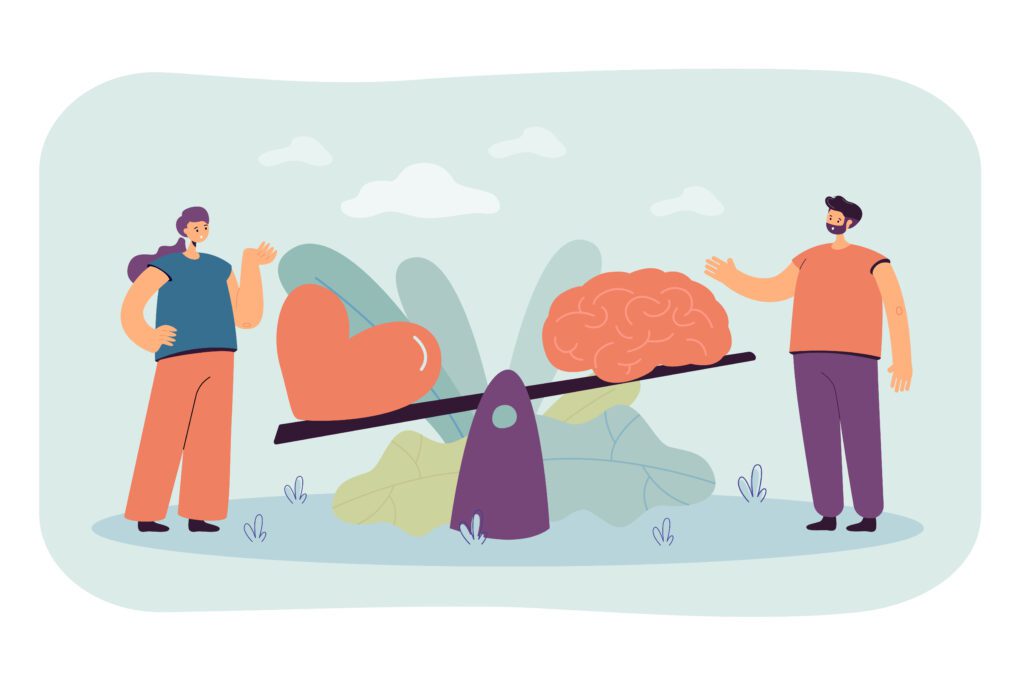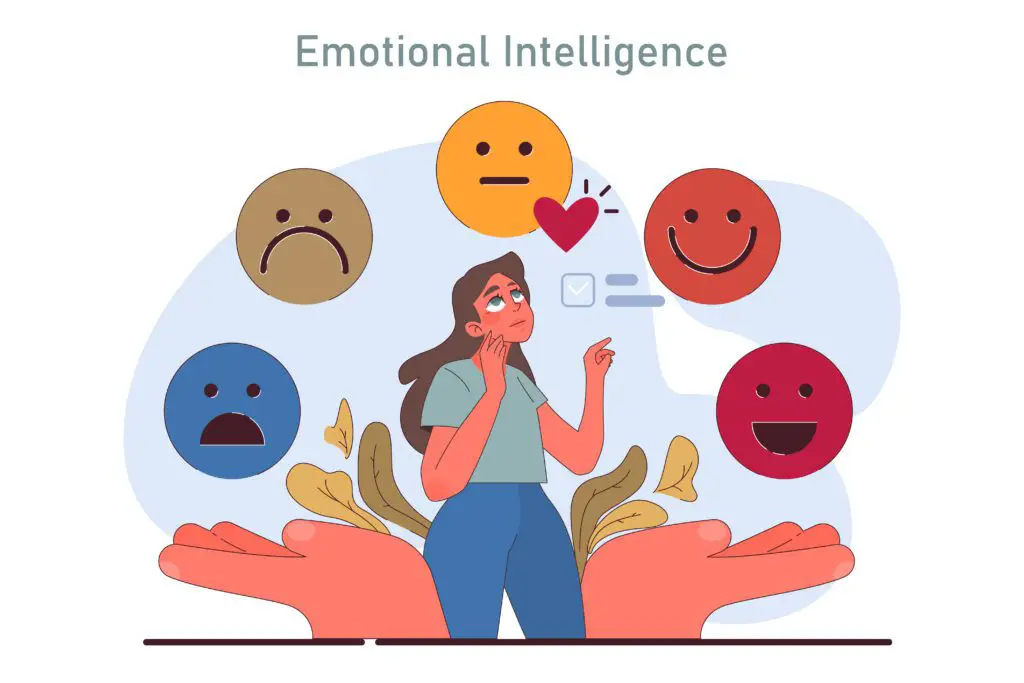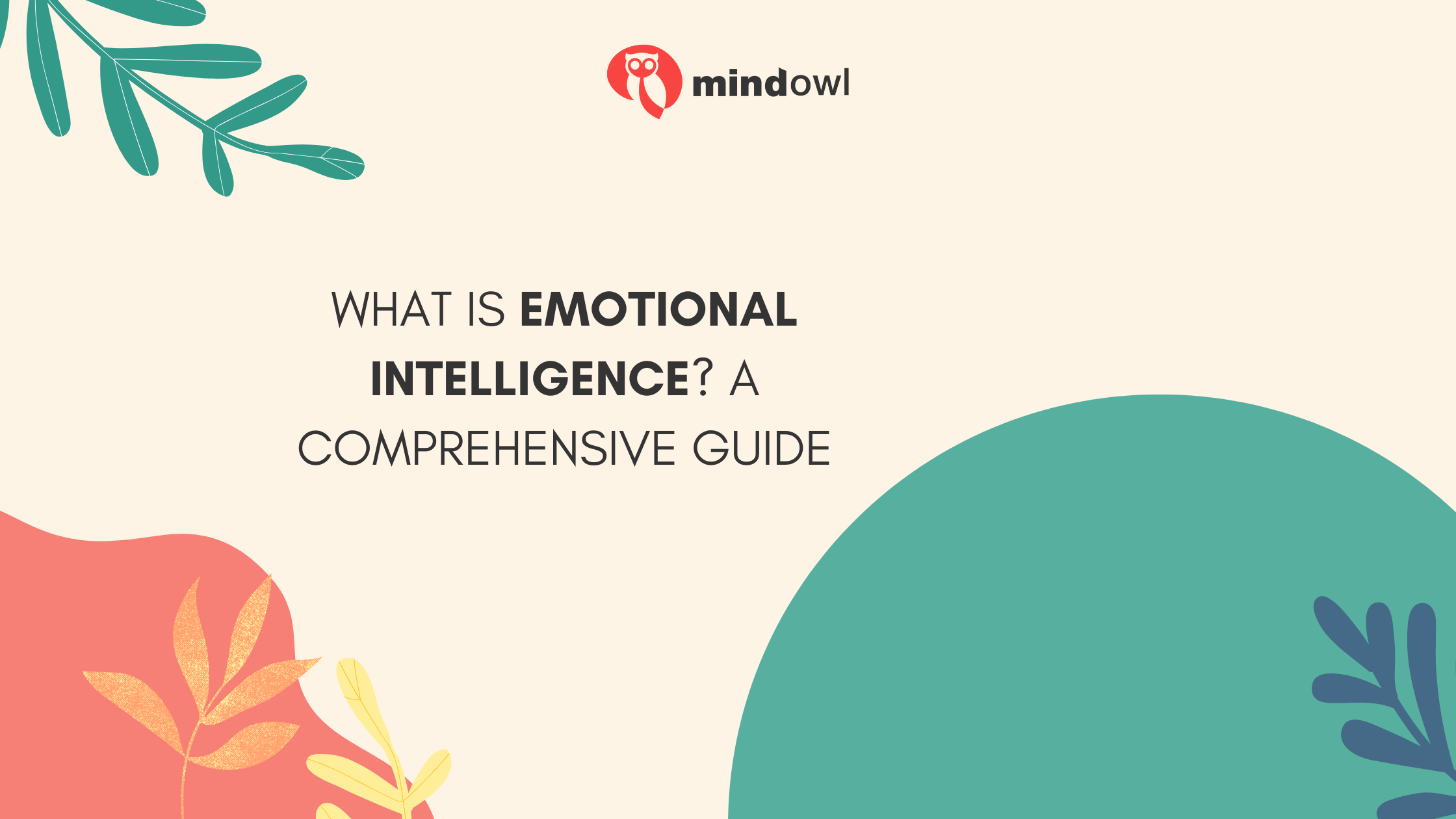Emotional intelligence, known as emotional quotient (EQ), is about understanding and managing our feelings and those of others. This skill helps us get along with people and lead them well, especially at work.
The idea was first suggested by Mayer, Salovey, and David Caruso (MSC). They told us about five main parts: knowing our emotions, controlling them, motivating ourselves, feeling what others feel, and being good at dealing with people.
Daniel Goleman expanded on this by mixing in how our brains work with how we act to define EQ. Knowing your EQ can lead to better jobs, stronger friendships, being a great leader, and feeling happier overall.
Yet if someone has high EQ but uses it the wrong way; they might trick or hurt others without meaning to. Some folks also worry that talking too much about EQ might stop new ideas because people rely too much on guesses rather than solid facts.
With all these different points of view; there’s a lot more to learn about emotional intelligence! Let’s find out more together.
Key Takeaways
- Emotional intelligence (EQ) involves understanding and managing your own emotions and those of others. It is crucial for good communication, strong relationships, and effective leadership.
- The ability model, mixed model, and trait model are different ways to explain EQ. They show how we perceive, express, and regulate emotions in ourselves and others.
- High emotional intelligence leads to better job performance, healthier relationships, successful leadership roles, and improved mental health.
- To measure EQ, people use questionnaires, self-reports, 360-degree feedback from peers or managers, performance tests on emotional tasks, and watching how people act in social settings.
- Improving EQ can help reduce bullying at school by teaching students how to handle their emotions better.

Understanding Emotional Intelligence (EQ)
History and Definitions
The concept of emotional intelligence (EI) or emotional quotient (EQ) first emerged in scholarly discussions in the early 1990s. Psychologists Peter Salovey and John Mayer proposed it as a form of social intelligence.
They suggested that EQ involves the ability to monitor one’s own and others’ feelings and emotions, to discriminate among them, and to use this information to guide one’s thinking and actions.
This groundbreaking idea laid the foundation for subsequent research into how understanding emotions plays a crucial role in our social interactions, decision-making processes, and personal growth.
Researchers Mayer, Salovey, along David Caruso (collectively known as MSC), later expanded on their definitions of emotional intelligence. They highlighted its importance not just as an academic curiosity but as a set of skills critical for managing oneself effectively in various life scenarios.
According to MSC, high emotional intelligence is characterised by self-awareness, impulse control, zeal and perseverance in mood regulation—abilities that significantly affect interpersonal relationships and job performance.
This broader understanding helped establish EI/EQ as a valuable metric alongside traditional intelligence quotient (IQ) measurements, setting the stage for practical applications in fields ranging from education to business leadership.
Ability Model
The Ability Model highlights emotional intelligence as a set of skills. These include the perception, evaluation, and management of emotions in oneself and others. It suggests that understanding emotions helps us think better and act more wisely.
This model is vital for personal well-being and building strong relationships.
Leaders find the Ability Model especially useful as it involves perceiving, expressing, and regulating emotions effectively. It influences how people make decisions, handle stress, and interact with others.
Mastering these emotional competencies enables emotionally intelligent leadership which is crucial for team success.
Measurement Methods
Measuring emotional intelligence is crucial in understanding how people manage their emotions and interact with others. Various methods exist to assess this ability, each with its unique focus.
- Questionnaires: One popular method involves using detailed questionnaires, like the Trait Emotional Intelligence Questionnaire. Respondents answer questions about their feelings and behaviours on a five-point Likert scale, from “strongly disagree” to “strongly agree”. This helps gauge their emotional awareness and ability to manage emotions.
- Self-reports: Individuals rate their own emotional abilities, providing insights into how they perceive their capacity to recognise, understand, and manage emotions. Although subjective, these reports can highlight personal views on one’s emotional skills.
- 360-degree feedback: This involves collecting assessments of an individual’s EQ from various sources, including peers, managers, subordinates, and clients. It offers a well-rounded view of how someone’s emotional intelligence manifests in different social contexts.
- Performance tests: Unlike questionnaires, these tests provide scenarios or tasks for individuals to solve, requiring the use of emotional intelligence skills. They measure the ability to identify emotions in faces or voices and the effective management of emotions in complex situations.
- Observational methods: Researchers or professionals observe individuals in social settings to note their responses to various emotional challenges. This approach provides direct evidence of how well people apply their emotional skills in real life.
Each method plays a critical role in painting a complete picture of an individual’s emotional intelligence by highlighting strengths and areas for improvement. These measurements can then guide personal development strategies focused on enhancing social awareness and relationship management skills.
Mixed Model
Daniel Goleman developed the mixed model of Emotional Intelligence (EI), which merges mental capabilities with personality traits. This approach considers a broad range of abilities, from understanding emotions to managing them effectively.
It emphasises how skills like self-awareness, empathy, and self-motivation play crucial roles in our interactions and personal growth.
The mixed model underscores the importance of recognising one’s emotional strengths and weaknesses. By blending traditional measures of cognitive intelligence with distinct personality traits, it provides a comprehensive view of how individuals perceive their own emotional competencies.
This synthesis aids in improving interpersonal skills, emotional regulation, and ultimately leads to better job performance and leadership qualities.
Trait Model
Petrides and Furnham developed the Trait Emotional Intelligence model in 2001. This model focuses on how individuals perceive their emotions and manage them to guide thinking and behaviour.
It sees emotional intelligence as a collection of emotional self-perceptions located at the lower levels of personality. In this view, EQ involves a set of emotional abilities linked closely with one’s personality traits.
The Trait Model is different from other models because it relies on an individual’s self-assessment to measure EQ. People use information about their understanding of emotions to help them think and make decisions.
This approach integrates elements from Goleman’s concept, mixing traditional cognitive intelligence with specific personality characteristics that enhance social skills and leadership potential.

General Effects of Emotional Intelligence
Job Performance
Emotional intelligence significantly impacts job performance. Research has shown a strong correlation between emotional intelligence and key job performance indicators such as salary, merit increases, team effectiveness, learning agility, sales success rate, and employee retention.
Effectively managing both personal emotions and understanding and influencing others’ emotions are vital components that contribute to enhanced job performance.
Studies have also associated emotional intelligence with the ability to navigate workplace dynamics, positively impacting leadership skills and overall work productivity. Individuals with higher emotional intelligence tend to exhibit stronger interpersonal skills which play a pivotal role in fostering a positive work environment while also contributing towards individual career advancement within an organisation.
Leadership
High emotional intelligence is particularly vital for effective leadership. Leaders with strong emotional intelligence can better understand their own emotions and those of others, allowing them to manage both sets of emotions effectively.
This crucial skill enables leaders to communicate in a more impactful way, build stronger relationships with their team members, and navigate workplace complexities adeptly. By harnessing emotional intelligence, leaders can inspire and motivate their teams while also excelling in their careers.
Emotional intelligence is an essential factor that contributes to a leader’s ability to communicate effectively and build robust professional relationships.
Health
Higher emotional intelligence is associated with reduced psychological distress and lower depression levels, highlighting its significant impact on mental well-being.
Additionally, current research indicates that individuals with higher emotional intelligence tend to experience improved overall psychological and physical health, emphasising the importance of understanding and developing emotional intelligence for fostering a healthy mind and body.
Integrating the facets of emotional intelligence into daily life not only enhances interpersonal relationships but also serves as a protective factor for mental well-being, promoting a holistic approach to personal health and social interactions.
Effects on Bullying
Research shows that emotional intelligence serves as a protective factor against becoming involved in bullying, whether as the perpetrator or the victim. Students who develop their ability to manage emotions effectively are less likely to bully others and are better equipped to handle potential bullying situations themselves.
Bullying is closely linked to lower levels of emotional control, self-efficacy, and empathy. College students demonstrating heightened emotional intelligence exhibit considerably fewer instances of engaging in or falling victim to school bullying.
This indicates not only a negative correlation between high EQ levels and bullying behaviour but also underscores EQ’s importance in fostering healthier interpersonal skills among peers and creating safer educational environments free from harassment and intimidation.
The Core Components of Emotional Intelligence
Self-Awareness
Self-awareness is the ability to recognize and understand your own emotions, moods, and drives, as well as their effect on others. It involves having a clear perception of your personality, including strengths, weaknesses, thoughts, beliefs, motivation, and emotions. Self-aware individuals are confident, realistic, and honest with themselves and others.
Developing self-awareness requires tuning in to your true feelings. If you evaluate your emotions, you can manage them. The major elements of self-awareness are self-confidence, realistic self-assessment, and a self-deprecating sense of humour. Self-awareness allows you to understand other people, how they perceive you, your attitude and your responses to them in the moment
Self-Management
Self-management, also known as self-regulation, is the ability to control or redirect disruptive impulses and moods, and the propensity to suspend judgment and think before acting. It involves managing your emotional reactions to situations and people.
Hallmarks of self-management include trustworthiness, integrity, comfort with ambiguity, and openness to change. People with strong self-management skills are flexible and adapt well to changing situations. They remain calm under pressure and recover quickly from setbacks. They express emotions appropriately and exercise restraint when needed.
Social Awareness
Social awareness is the ability to understand the emotional makeup of other people and how your words and actions affect others. It involves having empathy, sensing the emotions of others, understanding their perspective, and taking an active interest in their concerns.
Socially aware individuals are excellent listeners. They are skilled at recognizing the dynamics of a group or organization. They are attuned to emotional cues and adapt their words and behaviour to different contexts. They show sensitivity and understand others’ perspectives.
Relationship Management
Relationship management is the ability to influence, coach, and mentor others, and resolve conflict effectively. It involves knowing how to communicate clearly, disarm conflicts and build strong personal bonds.
Relationship management skills include effectiveness in leading change, persuasiveness, and expertise building and leading teams. Individuals who excel in relationship management can build rapport and trust quickly. They are good at cultivating and maintaining a web of relationships

The Importance of Emotional Intelligence
Impact on Relationships
High emotional intelligence positively impacts relationships by promoting a better understanding of one’s own emotions, leading to improved communication and empathy. Individuals with high emotional skills are more adept at recognising and managing their emotions, which in turn helps them navigate conflicts effectively and build stronger connections with others.
Research shows that people with high emotional intelligence have healthier and more satisfying relationships, as they are better able to express themselves authentically while understanding the emotions of those around them.
In contrast, individuals with lower emotional skills tend to struggle in maintaining healthy relationships due to difficulties in managing their own emotions and empathising with others.
Impact on Success
Emotional intelligence plays a pivotal role in determining success, whether at school, work or in relationships. Research suggests that individuals with high emotional intelligence are more likely to experience job satisfaction and lower burnout levels.
It also aids in effective leadership by enhancing communication and relationship-building skills.
Moreover, emotional intelligence is linked to higher levels of achievement and satisfaction within the workplace and can contribute significantly to overall life success. Understanding emotions and managing them effectively creates a positive impact on career growth, productivity, and personal development.
Harnessing emotional intelligence may lead to improved decision-making abilities as well as higher resilience when faced with challenges.
Impact on Mental Health
Improving emotional intelligence can have a significant impact on mental health and well-being. Uncontrolled emotions and stress can lead to vulnerability to anxiety and depression.
Research shows that higher emotional intelligence is associated with lower levels of psychological distress, while low emotional intelligence is linked to an increased risk of mental health disorders.
It’s essential to recognise the role emotional intelligence plays in managing mental health, as it can act as a protective factor against the detrimental effects of unmanaged emotions and stress.
How to Identify a Lack of Emotional Intelligence
Limited Emotional Vocabulary
Individuals with low emotional intelligence often struggle to accurately identify and express their feelings due to a limited emotional vocabulary. This limitation inhibits their ability to articulate their emotions effectively, leading to difficulties in understanding and managing their own emotional experiences.
Moreover, it hampers their capacity to empathise with others and communicate effectively within personal and professional relationships. Expanding one’s emotional vocabulary is crucial in enhancing emotional intelligence and developing healthier interpersonal connections.
Moving forward, let’s delve into the next section on “Lack of Self-Awareness and Empathy” to further understand the indicators of deficient emotional intelligence.
Lack of Self-Awareness and Empathy
Self-awareness and empathy are critical components of emotional intelligence. Those lacking in self-awareness struggle to recognise and understand their own emotions, thoughts, and reactions.
In turn, this may lead to difficulty managing disruptive impulses and navigating interpersonal relationships effectively.
Empathy plays a crucial role in emotional intelligence as it involves understanding the emotions of others. Individuals with limited empathy may find it challenging to connect with people on an emotional level, resulting in strained relationships and communication breakdowns.
Poor Emotional Regulation
Poor emotional regulation can lead to difficulty in managing one’s emotions effectively, impacting relationships and overall well-being. Chronic use of avoidance as a coping mechanism is associated with adverse long-term health outcomes, highlighting the importance of developing healthy emotional regulation skills.
Low emotional intelligence often results in challenges in understanding and controlling disruptive emotions and impulses, affecting personal and professional interactions. People with low emotional intelligence may struggle to recognise their own emotions or understand those of others around them, further exacerbating difficulties in navigating social situations.
Developing effective emotional regulation skills is crucial for maintaining mental health, building positive relationships, and enhancing overall quality of life.
Narrow range of social skills
Limited social skills can be a clear indication of low emotional intelligence, making it challenging to navigate interpersonal interactions effectively. Individuals with poor social skills may struggle to communicate assertively, empathise with others, or engage in active listening.
These limitations can hinder their ability to build and maintain meaningful relationships, impacting both personal and professional spheres.
Recognising the link between emotional intelligence and social proficiency is crucial in understanding how essential strong social skills are for successful navigation of various social situations.
Tips to Improve Emotional Intelligence
Thinking Before Reacting
Emotionally intelligent individuals understand the importance of pausing and considering their emotions before responding. This involves recognising that emotions can be intense in the moment but are also temporary, allowing for a thoughtful response rather than impulsive reactions which may lead to negative consequences.
Developing empathy for others is crucial in this process as it enables individuals to consider how their words or actions may impact those around them. By taking a moment to empathise with others, people can bridge understanding and respond in ways that are considerate of others’ feelings and perspectives, fostering healthier relationships and more productive interactions.
Improving Self-Awareness
Improving self-awareness is crucial for developing emotional intelligence. Recognising and naming our own emotions can be the first step. Seeking feedback from others and checking in with ourselves a few times a day can help build self-awareness.
Actively working on managing and understanding our emotions, through self-reflection and seeking feedback, also contributes to improving self-awareness and emotional intelligence.
By recognising our thoughts, feelings, and emotions, we can better understand ourselves and develop stronger emotional intelligence. Seeking feedback from others helps us gain insight into how we are perceived by those around us, contributing to improved self-awareness.
Developing Empathy for Others
To develop empathy for others, start by sharing your emotions and actively listening to those around you. Engaging in community projects can also help build empathy and strengthen social connections.
Practising empathy is essential for improving emotional intelligence, as it allows you to understand the emotions of people around you, thereby enhancing relationships and interactions.
It’s important to recognise that building empathy is just as crucial as being aware of your own emotions when developing emotional intelligence.
Practising Active Listening
Improving emotional intelligence involves practising active listening, a crucial skill for effective communication and understanding others. Active listening entails giving your full attention to the speaker, comprehending their message, and responding considerately.
Through active listening, individuals can demonstrate empathy and gain insights into others’ emotions and perspectives. Additionally, developing emotional intelligence through training includes mastering relationship management skills such as active listening and proficient communication.
It is important to note that practising active listening enhances one’s ability to understand others and fosters meaningful connections while integrating essential elements of emotional intelligence like empathy and effective communication.
Downsides of Emotional Intelligence
Potential for Manipulation and Exploitation
Emotional intelligence can be misused for manipulation, exploiting trust and vulnerabilities. High emotional intelligence may be wielded for deceptive purposes, harnessing positive relationships to serve self-serving motives.
Exploiting positive relationships by leveraging emotional cues and responses is a dark aspect of emotional intelligence. Individuals with self-serving motives may use their high EQ as a tool for manipulation and exploitation, capitalising on the trust and empathy they engender in others.
Societal Pressure to Avoid Conflicts
People with high emotional intelligence often face societal pressure to navigate difficult situations without causing conflicts. This expectation stems from the belief that individuals with strong EQ should be able to handle challenging interactions with empathy and understanding, leading others to rely on them for conflict resolution.
However, this can place a heavy burden on individuals who may also need support and understanding in managing their emotions within such situations.
The potential downside of this societal pressure is that it may lead to suppressing one’s own feelings and needs to maintain harmony, possibly resulting in the neglect of personal well-being and creating internal conflict.
Over-reliance on Intuition
Over-trusting one’s gut feelings without considering all available information may result in poor decision-making and judgment.
This can be associated with the downsides of higher emotional intelligence, as indicated by research findings and potential disadvantages related to this aspect of EQ.
While some individuals may naturally rely on their intuition, it is important to balance this with critical thinking and analysis. Individuals must recognise the limitations of intuitive decision-making and take into account the broader context when evaluating situations or making choices.
Criticisms of Emotional Intelligence
Predictive power
Emotional intelligence has faced criticism due to its limited predictive power and whether it truly correlates with success and job performance. Some argue that emotional intelligence’s ability to predict outcomes is not as robust as initially suggested, raising questions about its practical application in various contexts.
However, it’s crucial to consider the evolving research landscape, including meta-analytic investigations, to understand the nuanced relationship between emotional intelligence and performance outcomes.
Amidst ongoing debates about its predictive power, understanding the complexities of emotional intelligence remains pivotal in navigating leadership roles, relationships, and mental health.
Correlations with personality
Although emotional intelligence has been widely praised for its positive impact, it’s also crucial to understand its correlations with personality. Research shows that individuals with unstable personality traits, particularly those associated with substance abuse, tend to exhibit lower emotional intelligence.
Furthermore, studies have revealed a noteworthy relationship between trait emotional intelligence and the Big Five personality traits, especially Neuroticism. These findings highlight the intricate interplay between emotional intelligence and individual personality characteristics.
The correlation between emotional intelligence and specific personality traits can provide valuable insights into how personal disposition influences one’s capacity for recognising and managing emotions effectively.
Socially desirable responding
Individuals may respond to questions on emotional intelligence in a way that reflects social norms rather than their true feelings. This can impact the accuracy of self-reports and measures, potentially leading to an overestimation of emotional intelligence levels.
It is important to consider this factor when interpreting research findings or assessing one’s own emotional intelligence.
Conclusion
In conclusion, understanding emotional intelligence is vital for navigating social complexities and excelling in the workplace. It allows individuals to manage their feelings effectively, reduce stress, and improve communication.
Developing emotional intelligence can lead to better relationships and improved mental well-being. By recognising emotions, practising empathy, and seeking feedback from others, one can improve their emotional intelligence levels with practical actions.
Understanding emotions is important for career success and personal growth.
FAQs
1. What is emotional intelligence?
Emotional intelligence, also known as EQ or emotional quotient, is the ability to recognise and manage your own emotions and understand how they affect others. It helps you navigate social situations more effectively.
2. Why is emotional intelligence important?
Having high emotional intelligence can improve your mental health, relationships and job performance. It acts as a protective factor that enhances your ability to cope with stress and conflict.
3. Can you learn to improve your emotional intelligence?
Yes! Emotional intelligence can be learned and developed over time. By building skills like empathy, self-awareness, and emotion management, you can increase your EQ.
4. How does emotional intelligence benefit leadership?
In leadership roles especially important are skills in recognising emotions in others and managing both their own responses and those of their teams effectively. This leads to better decision-making and workplace harmony.
5. Are there tests for measuring my level of emotional intelligence?
There are measures of emotional intelligence available such as quizzes or assessments that help you gauge where your EQ stands currently. These tools offer insights into areas for improvement.
6. How do I start improving my EQ today?
Start by taking an honest look at how well you recognise your own emotions when they happen. Use this awareness to practise managing them more thoughtfully before reacting in stressful situations.
MindOwl Founder – My own struggles in life have led me to this path of understanding the human condition. I graduated with a bachelor’s degree in philosophy before completing a master’s degree in psychology at Regent’s University London. I then completed a postgraduate diploma in philosophical counselling before being trained in ACT (Acceptance and commitment therapy).
I’ve spent the last eight years studying the encounter of meditative practices with modern psychology.

